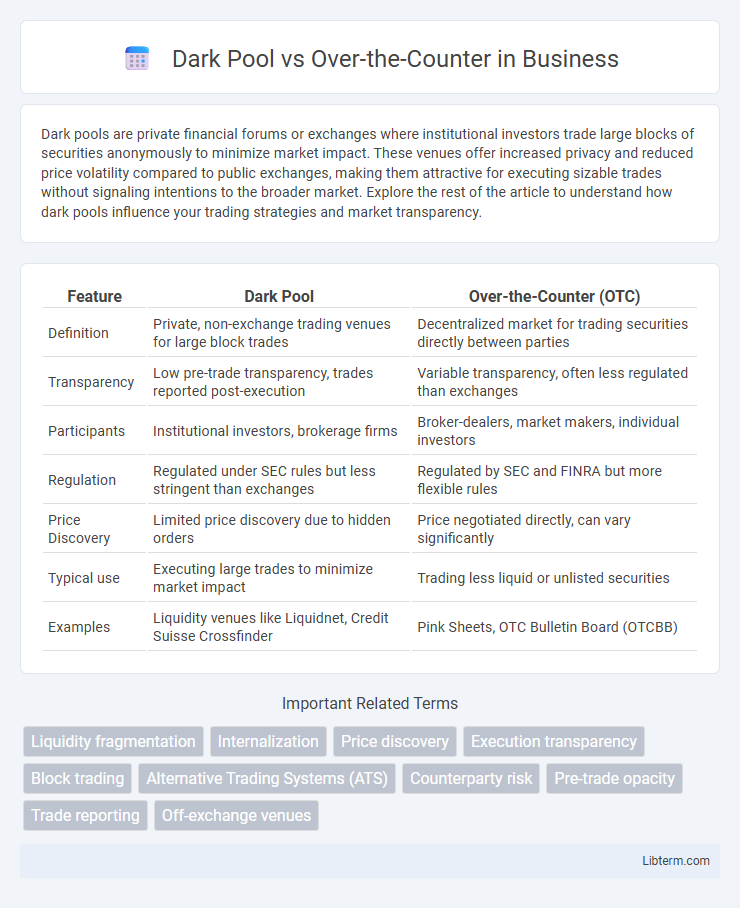Dark pools are private financial forums or exchanges where institutional investors trade large blocks of securities anonymously to minimize market impact. These venues offer increased privacy and reduced price volatility compared to public exchanges, making them attractive for executing sizable trades without signaling intentions to the broader market. Explore the rest of the article to understand how dark pools influence your trading strategies and market transparency.
Table of Comparison
| Feature | Dark Pool | Over-the-Counter (OTC) |
|---|---|---|
| Definition | Private, non-exchange trading venues for large block trades | Decentralized market for trading securities directly between parties |
| Transparency | Low pre-trade transparency, trades reported post-execution | Variable transparency, often less regulated than exchanges |
| Participants | Institutional investors, brokerage firms | Broker-dealers, market makers, individual investors |
| Regulation | Regulated under SEC rules but less stringent than exchanges | Regulated by SEC and FINRA but more flexible rules |
| Price Discovery | Limited price discovery due to hidden orders | Price negotiated directly, can vary significantly |
| Typical use | Executing large trades to minimize market impact | Trading less liquid or unlisted securities |
| Examples | Liquidity venues like Liquidnet, Credit Suisse Crossfinder | Pink Sheets, OTC Bulletin Board (OTCBB) |
Introduction to Dark Pool and Over-the-Counter Trading
Dark pool trading involves private exchanges where large institutional investors execute sizable trades away from public markets to reduce market impact and maintain confidentiality. Over-the-counter (OTC) trading occurs directly between two parties without centralized exchange supervision, often involving less liquid or unlisted securities. Both methods offer alternative liquidity sources, with dark pools emphasizing anonymity and OTC trading providing flexible transaction terms.
Key Definitions: Dark Pool vs Over-the-Counter
Dark pools are private, non-transparent trading venues where large institutional investors execute orders without revealing their intentions to the public market, minimizing market impact. Over-the-counter (OTC) trading occurs directly between two parties without centralized exchange involvement, allowing customized agreements but with less regulatory oversight and potentially lower liquidity. The fundamental difference lies in dark pools' focus on anonymity within institutional trading versus OTC's bilateral transaction flexibility across various asset classes.
How Dark Pools Operate
Dark pools operate as private trading venues where large institutional investors execute bulk orders away from public exchanges, minimizing market impact and preserving anonymity. These platforms match buy and sell orders internally, often using advanced algorithms to ensure optimal pricing without revealing trade intentions to the broader market. Unlike over-the-counter (OTC) transactions, which are negotiated privately between parties, dark pools maintain a structured environment with regulatory oversight, providing increased liquidity while reducing price volatility.
How Over-the-Counter Markets Function
Over-the-counter (OTC) markets function as decentralized platforms where trading occurs directly between two parties without a centralized exchange, enabling transactions of securities, derivatives, and other financial instruments. They rely on dealer networks to provide liquidity and facilitate price discovery, often accommodating assets not listed on formal exchanges. OTC markets offer flexibility in terms of contract customization and trade negotiation but typically involve higher counterparty risk due to the absence of centralized clearinghouses.
Advantages of Dark Pool Trading
Dark pool trading offers significant advantages such as enhanced privacy and reduced market impact by allowing large institutional investors to execute substantial trades without revealing their intentions to the wider market. Unlike over-the-counter (OTC) transactions, dark pools provide better price discovery and potential cost savings by matching buy and sell orders internally at mid-market prices. This discreet environment minimizes information leakage, helping to prevent adverse price movements often seen in OTC trades.
Benefits of Over-the-Counter Trades
Over-the-counter (OTC) trades offer greater flexibility by allowing customized contract terms tailored to specific client needs, which is not typically available in dark pools. OTC markets provide enhanced privacy and direct negotiation between parties, reducing market impact and potential price slippage seen in public venues. These trades often facilitate access to a broader range of securities, including less liquid or non-standard instruments, enabling investors to diversify portfolios more effectively.
Risks and Challenges in Dark Pool Markets
Dark pool markets present significant risks including reduced transparency, which can obscure true market liquidity and price discovery, leading to potential manipulation or unfair trading advantages. The lack of regulatory oversight compared to over-the-counter (OTC) markets heightens concerns over counterparty risk and trade execution quality. Dark pools also face challenges related to information asymmetry, where institutional investors may exploit non-public information, increasing the risk of market abuse.
Regulatory Landscape: Dark Pools vs OTC
The regulatory landscape for dark pools involves stringent oversight from entities like the SEC and FINRA, aiming to ensure transparency and prevent market manipulation in these private trading venues. Over-the-counter (OTC) markets face lighter regulation as transactions occur directly between parties without a centralized exchange, often resulting in less disclosure and higher counterparty risk. Regulatory measures increasingly target both dark pools and OTC markets to enhance market integrity and investor protection, although dark pools operate under more rigorous reporting requirements.
Comparing Transparency and Market Impact
Dark pools offer limited transparency by concealing order information to protect large trades from market impact, whereas Over-the-Counter (OTC) markets provide varying degrees of transparency depending on the participants and asset classes involved. The anonymity in dark pools minimizes price slippage and market disruption for institutional investors, while OTC trades can lead to fragmented liquidity and potentially higher market impact due to less standardized reporting. Regulatory scrutiny emphasizes transparency in OTC markets, yet dark pools remain preferred venues for executing large block trades with reduced immediate influence on public price movements.
Choosing Between Dark Pool and Over-the-Counter Trading
Choosing between dark pool and over-the-counter (OTC) trading depends on the trader's need for anonymity and market impact. Dark pools offer institutional investors private venues to execute large orders without revealing intentions, reducing market impact and price slippage. OTC trading provides direct negotiation between parties, often used for less liquid securities or customized transactions, prioritizing flexibility over the transparency found on public exchanges.
Dark Pool Infographic

 libterm.com
libterm.com